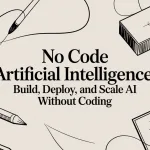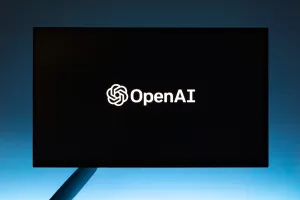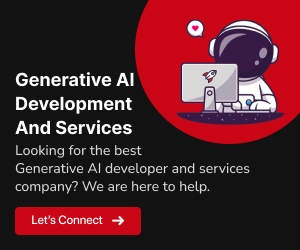Generative AI, a sector in artificial intelligence, leverages machine learning to create inventive content like images, text, and music. Its transformative potential spans diverse industries, from healthcare to entertainment. Seeking insight into Generative AI? Here are the top six recommended courses for 2023. AI, an abbreviation for Artificial Intelligence, involves developing computer systems mirroring human intelligence. It encompasses subfields such as machine learning, natural language processing, computer vision, and robotics, driving the evolution of systems handling complex cognitive tasks.
Generative AI
Generative AI (GAI) is a specialized branch of artificial intelligence focused on creating models that autonomously generate original content. These models produce new data, such as images, text, or music, after learning from existing datasets. By employing algorithms like Generative Adversarial Networks (GANs) and Variational Autoencoders (VAEs), Generative AI generates content by recognizing patterns and structures within the data. Consequently, GAI has diverse applications in art, language generation, medicine, and more, contributing significantly to innovation and problem-solving across various industries..
Top 6 Generative AI Courses
Generative AI is a captivating field within artificial intelligence that focuses on creating models capable of producing new and original content. As the applications of generative AI continue to expand, diving into the right courses can provide you with a profound understanding of this innovative technology. Here are six recommended courses to consider Generative AI courses in 2023:

Introduction to Generative AI (Google Cloud Skills Boost):
Perfect for beginners, this course serves as an ideal starting point for those new to generative AI. It covers the fundamental concepts, different types of generative AI models, their applications, and the process of building and deploying basic generative AI models using the Google Cloud Platform. This is know to be the top Generative AI courses in 2023.
Generative Adversarial Networks (GANs) Specialization (Coursera – deeplearning.ai):
Delve deeper into the world of generative AI with this specialization course focusing specifically on Generative Adversarial Networks (GANs). GANs are among the most widely used generative models. This course offers an in-depth understanding of how GANs operate, methods to train them effectively, and their application in generating realistic images, text, and various other types of content.
Natural Language Processing Specialization (Coursera – deeplearning.ai):
Natural Language Processing (NLP) plays a crucial role in generative AI by enabling machines to understand and generate human language. This specialization teaches you NLP techniques used for tasks like machine translation, text summarization, and sentiment analysis. Proficiency in NLP is vital for building generative AI models that create compelling text content.
Deep Learning for Self-Driving Cars (Coursera – Stanford University):
This course provides insights into deep learning, an essential aspect of training generative AI models. Participants will grasp the basics of neural networks, backpropagation, and regularization. Additionally, they’ll learn how to apply deep learning techniques in training models for solving complex real-world problems, like those encountered in self-driving cars.
Advanced Machine Learning Specialization (Coursera – National Research University Higher School of Economics):
A more advanced course, this specialization covers a wide array of machine learning techniques, including generative AI. Topics range from different machine learning algorithms to methods for evaluating their performance and real-world applications.
Creative Applications of Deep Learning with TensorFlow (Coursera – Kadenze):
This practical course guides learners through utilizing TensorFlow, a prominent deep learning framework, to construct creative AI applications. Participants will gain expertise in training GANs, variational autoencoders, and other generative AI models using TensorFlow. The course includes projects such as text-to-image generation and music generation.
Choosing the Right Course
The best Generative AI courses in 2023 for you depends on your existing knowledge of AI and machine learning. Beginners should consider starting with the Introduction to Generative AI course. Those with some background can explore specialized courses like GANs or NLP specializations. For individuals interested in self-driving cars, the Deep Learning for Self-Driving Cars course would be a suitable choice. Meanwhile, the Advanced Machine Learning Specialization caters to those looking for a more extensive understanding of machine learning techniques.
If you’re keen on using TensorFlow for creative AI applications, the Creative Applications of Deep Learning with TensorFlow course is highly recommended. Select the course that aligns with your expertise and interests, and embark on an exciting journey into the realm of Generative AI!
Wishing you a rewarding and enlightening learning experience in the world of Generative AI in 2023!
Also Read: “The Best Roadmap to Learn Generative AI in 2023“.
Frequently asked questions
What is Artificial Intelligence (AI)?
Artificial Intelligence (AI) refers to the development of computer systems that can perform tasks requiring human-like intelligence. It encompasses various subfields such as machine learning, natural language processing, computer vision, and robotics
How does AI work?
AI systems work by processing large volumes of data and identifying patterns to make decisions or predictions. They use algorithms and models that learn from data to perform tasks ranging from recognizing speech to playing games.
What is Generative AI (GAI)?
Generative AI (GAI) is a specialized branch of AI that focuses on creating models capable of autonomously generating new and original content. These models produce data like images, text, or music after learning from existing datasets.
What are some examples of Generative AI models?
Some examples of Generative AI models include Generative Adversarial Networks (GANs), Variational Autoencoders (VAEs), and sequence-to-sequence models. GANs, for instance, create content by pitting two neural networks against each other to generate highly realistic outputs.
How is Generative AI different from other AI models?
Generative AI distinguishes itself from other AI models by focusing on creating new content, whereas other AI models perform tasks such as classification, prediction, or task automation without generating new content.
What are the applications of Generative AI?
Generative AI showcases its versatility across various domains: in art and design, it aids in creating new visual concepts; within language generation, it contributes to storytelling and conversational AI. Moreover, it plays a pivotal role in medicine, facilitating drug discovery and genetic analysis, while in the gaming industry, it excels in generating dynamic content and adapting to user behavior.
How does Generative AI learn to create new content?
Generative AI models learn to create new content by analyzing patterns and structures within existing datasets. They use this knowledge to generate new data that aligns with the learned patterns.
Is Generative AI only about creating art or visuals?
No, Generative AI extends beyond art and visuals. While extensively applied in creative fields for image and art generation, its wide-reaching applications span across various industries, encompassing healthcare, language generation, gaming, and more.
What skills are essential for working in Generative AI?
Skills such as a strong understanding of machine learning concepts, proficiency in programming languages like Python, knowledge of neural networks, and familiarity with AI frameworks like TensorFlow or PyTorch are essential for working in Generative AI.
What are the future prospects of Generative AI?
The future of Generative AI holds immense promise. It’s expected to further revolutionize multiple industries by enabling innovative content creation, personalized user experiences, and novel applications in diverse domains, marking a new phase of AI development.
Feel free to explore more about AI and Generative AI through these FAQs, and stay updated with the latest advancements in this rapidly evolving field!


























Add Comment